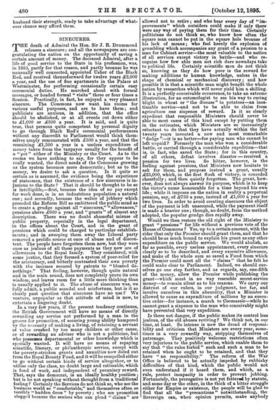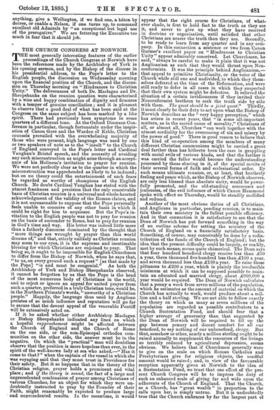SINECURES.
11HE death of Admiral the Hon. Sir J. R. Drummond releases a sinecure; and all the newspapers are con- gratulating the nation on the opportunity of saving a certain amount of money. The deceased Admiral, after a life of good service to the State in his profession, was, in 1883, partly for that reason, and partly because he was unusually well connected, appointed Usher of the Black Rod, and received thenceforward for twelve years £2,000 a year, and the use of fine apartments in the Palace at Westminster, for performing occasionally certain easy ceremonial duties. He marched about with formal messages, or headed formal " visits" three or four times a Session. Practically, in fact, he enjoyed a very pleasant sinecure. The Commons now want his rooms for various useful purposes, and are to have them ; and publicists are anxious, in addition, that the office should be abolished, or at all events cut down either to £1,000 or £500 a year. It is said, and is quite true, that persons quite competent by personal dignity to go through Black Rod's ceremonial performances without any discredit to Parliament would think them- selves amply remunerated with £500 a year, and that the remaining £1,500 a year is a useless expenditure of money taken from the taxpayer usually for the benefit of a "pet" either of the Ministry or the Court. As to the rooms we have nothing to say, for they appear to be really wanted, the direct needs of the Commons growing as the system becomes more democratic ; but as to the money, we desire to ask a question. Is it quite so certain as is assumed, the evidence being the experience of statesmen, that the existence of a few sinecures is in- jurious to the State ? That it should be thought to be so is intelligible,—first, because the idea of no pay except for work done, is in an industrious population a natural one ; and secondly, because the welter of jobbery which preceded the Reform Bill so embittered the public mind as to create a grudge against all " sinecures," " allowances," pensions above £600 a year, and " grants " of almost any description. There was no doubt shameful misuse of public property, especially in the legal department, in the offices about the Court, and in the grant of pensions which could be charged to particular establish- ments ; and in sweeping them away the Liberal party removed a prolific source at once of abuse and of discon- tent. The people have forgotten them now, but they were once as jealous of all these payments as they now are of allowances to the Royal family. They considered, with some justice, that they formed a system of poor-relief for the aristocracy, and bitterly contrasted their own poverty with the incomes secured by patents to " bloated do- nothings." That feeling, however, though quite natural and in the main sound, does not completely prove its own wisdom, and leaves room for a little more thinking than is usually applied to it. The abuse of sinecures was, we fully admit, a public scandal and misfortune, but is it so clearly past question that sinecures have no use ? We venture, unpopular as that attitude of mind is now, to entertain a lingering doubt. In a very few years, if the present tendency continues, the British Government will have no means of directly rewarding any service not performed by a man in the groove for promotion, of securing young ability hampered by the necessity of making a living, of retaining a servant of value crushed by too many children or other cause, or of rewarding an adviser who is not a politician, but who possesses departmental or other knowledge which is specially wanted. It will have no means of repaying scientific, literary, or philanthropic service, except with the poverty-stricken grants and annuities now doled out from the Royal Bounty Fund, and it will be compelled either to go without certain kinds of service altogether, or to utilise only the class, no doubt large and estimable, which is fond of work, and independent of pecuniary reward. That, says the democrat., is an ideally healthy position ; but is he not speaking without thought from a traditional feeling ? Certainly the Services do not think so, who see the business world so "comfortable," and themselves often so terribly " badden doun " by poverty ; who see promotion clogged because the seniors who can plead " claims" are allowed not to retire ; and who hear every day of " im- provements" which outsiders could make if only there were any way of paying them for their time. Certainly politicians do not think so, who know how often the square man cannot be put in the square hole because of his lack of means ; who feel keenly the explosion of grumbling which accompanies any grant of a pension to a man for Cabinet service—the most valuable to the nation of all services except victory in battle—and who re- cognise how few able men not rich dare nowadays take to political life. Certainly scientific men do not think so, knowing as they do how poor is the reward for making additions to human knowledge, unless in the shape of chemical or mechanical discovery ; and how possible it is that a scientific man might benefit the whole nation by researches which will never yield him a shilling. It is a perfectly conceivable occurrence, to take an extreme illustration, for an entomologist to see his way to curing blight in wheat or " the disease" in potatoes—an ines- timable service—and not to be able to claim from agriculture one sixpence of reward. Is it so clearly expedient that responsible Ministers should never be able to meet cases of this kind except by putting them in the estimates, which Ministers are so increasingly reluctant to do that they have actually within the last twenty years invented a new and most remarkable "dodge "—it is no better—for paying men who cannot be left unpaid ? Formerly the man who won a considerable battle, or carried through a considerable expedition—that is, in fact, who saved the State ; for in this country, of all others, defeat involves disaster —received a pension for two lives. So bitter, however, is the feeling against pensions, that Ministers now hesitate to ask for them, and propose instead a grant, usually £25,000, which, in the first flush of victory, is conceded cheerfully ; and then quietly forgotten. The grant, how- ever, does not always answer its purpose, which is to keep the victor's name honourable for a time beyond his own life ; while it imposes on the nation in reality a perpetual pension, say, of £750 a year, instead of £1,000 a year for two lives. In order to avoid creating sinecures the object of the payment is left unsecured, while the payment itself is made a heavier one ; though, no doubt, from the method adopted, the popular grudge dies rapidly away.
Would we then restore the old right of the Ministry to grant " pensions " for life without a previous vote of the House of Commons ? Yes, up to a certain amount, with the rider that only the Premier should grant them, and that he should be as much bound to explain his grant as any other expenditure on the public service. We would abolish, so far as possible, every useless appointment, every sinecure clearly so to be described, and every excessive allowance, and make of the whole sum so saved a Fund from which the Premier could meet all the " claims" that he felt he could make clear to Parliament. Indeed, we should our- selves go one step farther, and as regards, say, one-fifth of the money, allow the Premier while publishing the grant—which must in no way resemble secret-service money—to remain silent as to his reasons. We carry our distrust of our rulers, in our judgment, too far, and involve ourselves in this absurdity, that a Minister is allowed to cause an expenditure of millions by an execu- tive order—for instance, a march to Coomassie—while he cannot grant a sixpence to the man who conceivably might have prevented that very expedition.
Is there not danger, if the public makes its control less jealous, of the old abuses reviving ? We think not, in our time, at least. So intense is now the dread of responsi- bility and criticism that Ministers are every year, some- times in a very cowardly way, stripping themselves of patronage. They positively welcome restrictions often very injurious to the public service, which enable them to say that " the rules forbid " such and such a man to be retained when he ought to be retained, and that they have " no responsibility." The reform of the War Office is believed to be actually impeded by rubbishy difficulties of that kind, which the public would not even understand if it heard them, and which, as a rule, protect incapacity in order to prevent jobbing. Fortunately, the prerogative is not yet fettered by statute, and some day or the other, in the thick of a bitter struggle either for Empire or existence, the people will be glad to find that all the " precautions " notwithstanding, the Sovereign can, when opinion permits, make anybody anything, give a Wellington, if we find one, a Won by decree, or enable a Nelson, if one turns up, to command excellent old Admirals by " an exceptional but legal use of the prerogative." We are fettering the Executive too much in fear that it should job.



















































 Previous page
Previous page